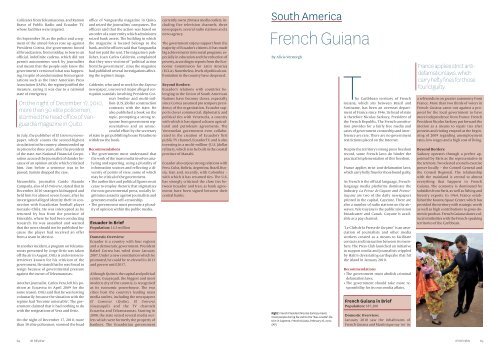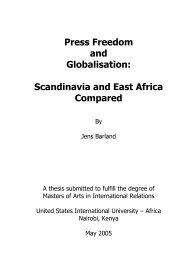FOCUS ON THE AMERICAS - International Press Institute
FOCUS ON THE AMERICAS - International Press Institute
FOCUS ON THE AMERICAS - International Press Institute
You also want an ePaper? Increase the reach of your titles
YUMPU automatically turns print PDFs into web optimized ePapers that Google loves.
Cañizares from Teleamazonas, and Ramon<br />
Bravo of Public Radio and Ecuador TV,<br />
whose facilities were targeted.<br />
On September 30, as the police and a segment<br />
of the armed forces rose up against<br />
President Correa, the government forced<br />
all broadcasters, from midday, to bow to an<br />
official, indefinite cadena, which did not<br />
permit autonomous work by journalists<br />
and meant that the people only knew the<br />
government’s version of what was happening.<br />
In spite of condemnation from organizations<br />
such as the Inter American <strong>Press</strong><br />
Association (IAPA), the regime justified the<br />
measure, saying it was due to a national<br />
state of emergency.<br />
On the night of December 17, 2010,<br />
more than 30 elite policemen,<br />
stormed the head office of Vanguardia<br />
magazine in Quito.<br />
In July, the publisher of El Universo newspaper,<br />
which counts the second-highest<br />
circulation in the country, almost ended up<br />
in prison for three years, after the president<br />
of the state-run National Financial Corporation<br />
accused the journalist of slander because<br />
of an opinion article which criticized<br />
him. Just before a sentence was to be<br />
passed, Samán dropped the case.<br />
Meanwhile, journalist Guido Manolo<br />
Campaña, also of El Universo, stated that in<br />
December 2010 strangers kidnapped and<br />
held him for almost seven hours, after he<br />
investigated alleged identity theft in connection<br />
with Ecuadorian football player<br />
Gonzalo Chila. He was intercepted as he<br />
returned by bus from the province of<br />
Emeralds, where he had been conducting<br />
research. He was assaulted and warned<br />
that the news should not be published because<br />
the player had received an offer<br />
from a team in Mexico.<br />
In another incident, a program on Teleamazonas<br />
presented by Jorge Ortiz was taken<br />
off the air in August. Ortiz is a television interviewer<br />
known for his criticism of the<br />
government. He stated that he was forced to<br />
resign because of governmental pressure<br />
against the owner of Teleamazonas.<br />
Another journalist, Carlos Vera, left his position<br />
at Ecuavisa in April 2009 for the<br />
same reason. Ortiz said that he was leaving<br />
voluntarily because the situation with the<br />
regime had “become untenable”. The government<br />
claimed that it had nothing to do<br />
with the resignations of Vera and Ortiz.<br />
On the night of December 17, 2010, more<br />
than 30 elite policemen, stormed the head<br />
office of Vanguardia magazine in Quito,<br />
and seized the journalists’ computers. The<br />
officers said that the action was based on<br />
an order of a state entity which administers<br />
seized bank assets. The building in which<br />
the magazine is located belongs to the<br />
bank, and the officers said that Vanguardia<br />
had not paid the rent. The magazine’s publisher,<br />
Juan Carlos Calderón, complained<br />
that they were victims of "political action<br />
from the government", since the magazine<br />
had published several investigations affecting<br />
the regime’s image.<br />
Calderón, who used to work for the Expreso<br />
newspaper, uncovered major alleged corruption<br />
scandals involving President Correa’s<br />
brother and multi-mil-<br />
lion-[U.S.]dollar construction<br />
contracts with the state. He<br />
also published a book on the<br />
topic, prompting a strong response<br />
from government representatives<br />
and an unsuccessful<br />
effort by the secretary<br />
of state to get publishing house Paradiso to<br />
withdraw the book.<br />
Recommendations<br />
• The government must understand that<br />
the work of the mass media involves analyzing<br />
and reporting, using a plurality of<br />
information sources and reflecting a diversity<br />
of points of view, some of which<br />
may be critical of the government.<br />
• The authorities and political figures must<br />
cease to employ rhetoric that stigmatizes<br />
the non-governmental press, socially legitimizes<br />
assaults against journalists and<br />
generates media self-censorship.<br />
• The government must promote a plurality<br />
of opinion within the public media.<br />
Ecuador in Brief<br />
Population: 14.5 million<br />
Domestic Overview:<br />
Ecuador is a country with four regions<br />
and a democratic government. President<br />
Rafael Correa has ruled since January<br />
2007. Under a new constitution which he<br />
promoted, he could be re-elected in 2013<br />
and govern until 2017.<br />
Although Quito is the capital and political<br />
center, Guayaquil, the biggest and most<br />
modern city of the country, is recognized<br />
as its economic powerhouse. The two<br />
cities host the country’s leading mass<br />
media outlets, including the newspapers<br />
El Comercio (Quito), El Universo<br />
(Guayaquil) and the TV channels<br />
Ecuavisa and Teleamazonas. Starting in<br />
2008, the state seized several media outlets<br />
which were formerly the property of<br />
bankers. The Ecuadorian government<br />
currently owns 20 mass media outlets, including<br />
five television channels, three<br />
newspapers, several radio stations and a<br />
news agency.<br />
The government enjoys support from the<br />
majority of Ecuador’s citizens. It has made<br />
big achievements in its social programs, especially<br />
in education and the reduction of<br />
poverty, according to reports from the Economic<br />
Commission for Latin America<br />
(ECLA). Nonetheless, levels of political confrontation<br />
in the country have deepened.<br />
Beyond Borders:<br />
Ecuador’s relations with countries belonging<br />
to the Union of South American<br />
Nations have become closer, especially<br />
since Correa assumed pro tempore presidency<br />
of the organization. Ecuador supports<br />
closer commercial, diplomatic and<br />
political ties with Venezuela, a country<br />
with which it has signed a dozen agricultural<br />
and petroleum agreements. The<br />
Venezuelan government even collaborated<br />
in the creation of Ecuador’s first<br />
public TV channel, EcuadorTV, and is also<br />
investing in a multi-million-[U.S.]dollar<br />
refinery, which is to be built in the coastal<br />
province of Manabí.<br />
Ecuador also enjoys strong relations with<br />
Peru, Cuba, Bolivia, Argentina, Brazil, Russia,<br />
Iran and, recently, with Colombia –<br />
with which it has resumed ties. The U.S.<br />
has strongly criticized the close ties between<br />
Ecuador and Iran, as bank agreements<br />
have been signed between their<br />
central banks.<br />
South America<br />
French Guiana<br />
By Alicia Versteegh<br />
Right: French President Nicolas Sarkozy meets<br />
Creol people during his visit to the "Eau-Lisette" district<br />
in Cayenne, French Guiana, February 18, 2010.<br />
(AP)<br />
The Caribbean territory of French<br />
Guiana, which sits between Brazil and<br />
Suriname, has been an overseas department<br />
of France since 1946. Its head of state<br />
is therefore Nicolas Sarkozy, President of<br />
the French Republic. The French constitution<br />
provides for a fairly free media and<br />
cases of government censorship and interference<br />
are rare. There are no government<br />
restrictions placed on the Internet.<br />
Despite the territory’s strong press freedom<br />
record, some French laws do hinder the<br />
practical implementation of this freedom.<br />
France applies strict anti-defamation laws,<br />
which carry hefty fines for those found guilty.<br />
As French is the official language, Frenchlanguage<br />
media platforms dominate the<br />
industry. La <strong>Press</strong>e de Guyane and France-<br />
Guyane are two of the daily newspapers<br />
printed in the capital, Cayenne. There are<br />
also a number of radio stations on the airwaves.<br />
Tele Guyane is the public television<br />
broadcaster and Canal+ Guyane is available<br />
as a pay channel.<br />
“Le Club de la <strong>Press</strong>e de Guyane” is an association<br />
of journalists and other media<br />
workers created as a means to facilitate<br />
contacts and interaction between its members.<br />
The <strong>Press</strong> Club launched an initiative<br />
to support media and journalists crippled<br />
by Haiti’s devastating earthquake that hit<br />
the island in January 2010.<br />
Recommendations<br />
• The government must abolish criminal<br />
defamation laws.<br />
• The government should take more responsibility<br />
for its own media affairs.<br />
French Guiana in Brief<br />
Population: 187,200<br />
Domestic Overview:<br />
January 2010 saw the inhabitants of<br />
French Guiana and Martinique say ‘no’ in<br />
France applies strict antidefamation<br />
laws, which<br />
carry hefty fines for those<br />
found guilty.<br />
a referendum on greater autonomy from<br />
France. More than two thirds of voters in<br />
French Guiana came out against a proposal<br />
for the local government to have<br />
more independence from France. French<br />
President Nicolas Sarkozy put forward the<br />
motion as a means to repair ties after<br />
protests and rioting erupted at the beginning<br />
of 2009 regarding unemployment<br />
rates, low wages and a high cost of living.<br />
Beyond Borders:<br />
Sarkozy operates through a prefect appointed<br />
by Paris as the representative in<br />
the territory. Two elected councils exercise<br />
power locally – the Conseil General and<br />
the Conseil Regional. The relationship<br />
with the mainland is central to almost<br />
everything that happens in French<br />
Guiana. The economy is dominated by<br />
subsidies from Paris, as well as fishing and<br />
forestry exports. In 1964, France established<br />
the Kourou Space Center, which has<br />
provided the territory with strategic worth<br />
as well as high contributions to gross domestic<br />
product. French Guiana shares cultural<br />
similarities with the French-speaking<br />
territories of the Caribbean.<br />
64 IPI REVIEW<br />
IPI REVIEW 65

















